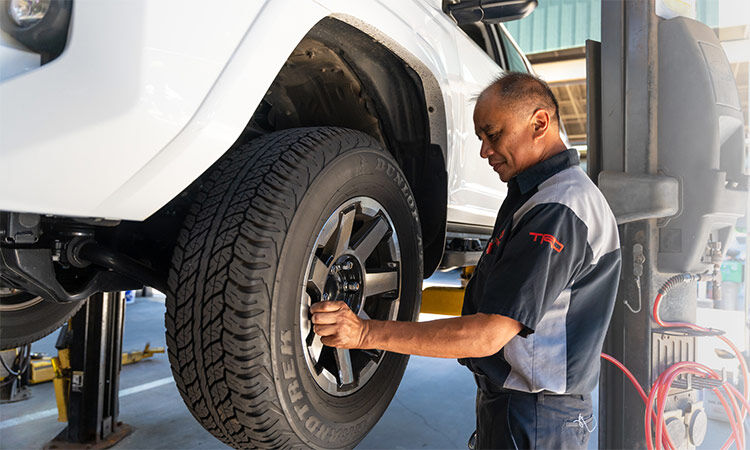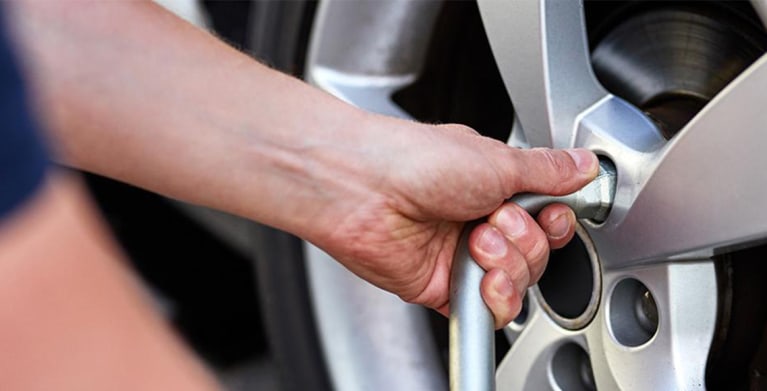Open Performance: Expert GMC Tire Service at Morris Tires
Wiki Article
Tire Solution: The Influence of Weather Condition Problems
When it comes to making certain ideal performance and security when driving, recognizing the influence of weather on tire solution is critical. From scorching heat to icy roadways, each weather component can dramatically affect tire capability and general driving experience. By diving right into the effects of differing climate condition on tires, drivers can acquire important understandings that might enhance their car's performance and long life. In this conversation, we will certainly explore the intricate connection in between weather conditions and tire solution, clarifying the relevance of weather-specific tire maintenance techniques and considerations.Heat and Tire Performance
When exposed to heats, tires experience adjustments in efficiency that can substantially influence vehicle security and handling. The heat produced from extended driving or heat conditions creates the tire rubber to soften, bring about minimized tread life and increased wear. As the rubber ends up being softer, the tire's hold when traveling reduces, impacting braking distances and total traction. In severe instances, too much warmth can also create tire blowouts, presenting a serious safety risk to the automobile and its occupants.
Winter Effects
Winter conditions can have a significant influence on tire performance and security. As temperatures decline, tire rubber can solidify, bring about lowered traction on icy or snow-covered roads. In chilly weather, tires may also lose atmospheric pressure a lot more swiftly, which can affect managing and gas performance. Additionally, cold temperatures can cause tire sidewalls to stiffen, increasing the risk of damage from splits or other roadway threats.To minimize the effects of cold climate on tires, it is essential to frequently inspect tire stress and inflate them to the supplier's suggested degrees. Making use of winter season or all-season tires made for winter conditions can likewise boost grip and grasp on icy or snowy roadways. Correct tire upkeep, including regular assessments for wear and damage, becomes much more crucial throughout colder months to guarantee optimal performance and security.
Rainy Issues Impact
During stormy conditions, tire performance and safety and security can be significantly affected by the wet roadway surface areas and reduced visibility. The step pattern of tires plays a critical function in keeping grip on wet roadways. Tires with damaged footsteps are extra prone to hydroplaning, where a layer of water develops between the road and the tire surface, leading to loss of traction. To battle this, drivers must on a regular basis examine click reference their tires for ample tread deepness and consider purchasing tires specifically designed for damp problems.Furthermore, wet weather condition can likewise reduce exposure, making it testing for vehicle drivers to see the road ahead plainly (GMC Tire Service). In such problems, it is crucial to change driving rates accordingly and maintain a risk-free adhering to distance to enable unexpected quits. Appropriately inflated tires can also aid in keeping control on wet roadways by supplying far better handling and grasp
Snow and Tire Safety And Security
Snow-covered roadways posture one-of-a-kind obstacles for motorists, highlighting the significance of proper tire option and maintenance. When driving in snowy conditions, having the appropriate tires can make a substantial distinction in safety and efficiency. Winter tires are designed with special rubber substances and tread patterns to give far better grip on snow and ice compared to all-season tires. The deeper footsteps and sipes of wintertime tires assist grip the road much better, minimizing the threat of sliding and slipping.
Moreover, chauffeurs must consider mounting tire chains in extreme snowy conditions. Tire chains give additional grip by gripping the snow and ice, improving stability and control. However, it is important to adhere to producer instructions when setting up and utilizing tire chains to avoid damage to the tires and lorry. By selecting the appropriate tires, maintaining appropriate inflation, and next page thinking about extra traction aids like tire chains, drivers can boost their security when browsing snow-covered roadways.
Weather-Related Tire Upkeep
Weather-related tire maintenance encompasses an array of practices intended at making certain ideal tire function and durability in different weather circumstances. One vital element of weather-related tire maintenance is tire stress regulation. Checking tire tread consistently and changing tires when tread wear gets to a certain deepness is important for preserving grip find out here now and stability in adverse weather condition.
Verdict
In conclusion, climate problems have a considerable effect on tire performance and safety. From heat impacting tire pressure and use to cool climate lowering traction, it is important to consider the weather when keeping and utilizing tires.In this discussion, we will check out the intricate partnership between climate problems and tire service, losing light on the value of weather-specific tire maintenance methods and factors to consider.

Report this wiki page